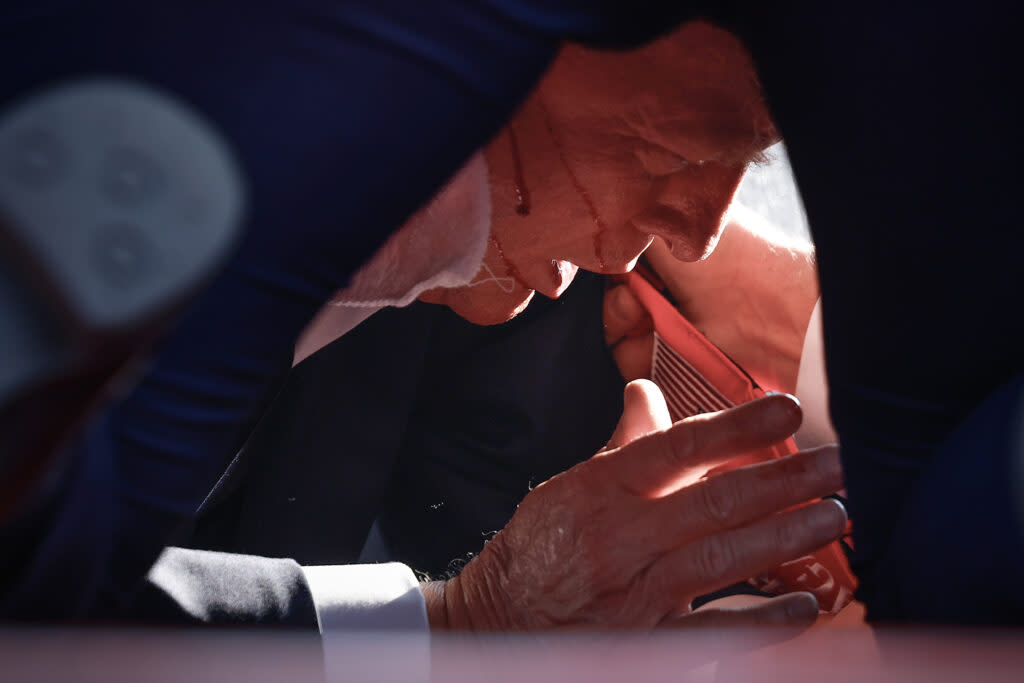Enough with the platitudes. How about some radical empathy and accountability?

- Oops!Something went wrong.Please try again later.
Republican presidential candidate former President Donald Trump is shown covered by U.S. Secret Service agents after an incident during a rally on July 13, 2024, in Butler, Pennsylvania. (Anna Moneymaker/Getty Images)
In the wake of a public tragedy, America defaults to useless platitudes and hollow sentimentality. The discussions ask or yield little, and people forget them until the next public tragedy. Society remains locked in a loop of systemic paralysis.
“This is not who we are.” “We’re better than this.” “We need to turn down the rhetoric.” “We need to embrace each other as neighbors and friends and fellow human beings.” “We’re all in this together.” These really test the gag reflex because they’re so manifestly untrue.
Such inanities dominated reports following the attempted assassination of former President Donald Trump. These are essentially indirect apologies without the promise of change. There’s an erasure in this attitude. It’s a dodge. An end-run. Work avoidance.
The culture cannot escape this loop without asking more of ourselves and each other. What’s actually needed here is simple but could transform our public discourse: practicing radical accountability along with radical empathy.
Why radical accountability? Because it is change focused. It can force us to be specific about concerns without the personalization. We can tell the truth, but civilly.
Radical accountability means holding ourselves accountable as well as others. Radical empathy means reserving an empathetic ear for others as well as for us and our friends.
Maybe we should try to address the issues in the conflict and instead of judging each other without standing or insight, we should extend people a little grace.
But we must do both. Right now, the respective camps have lined up behind one or the other.
Lowering the temperature is fine, but when it’s actually about ignoring a problem in favor of “playing nice,” it just creates more frustration and tension that eventually boils over. As Martin Luther King Jr. famously said, “riots are the language of the unheard.”
Radical accountability and radical empathy would allow us to extend concern for the health of the former president, while also pointing out a litany of his diatribes. We can decry political violence while pointing out that perhaps more than any president in history, he has invoked violent rhetoric:
“If you see someone getting ready to throw a tomato, knock the crap out of them.”
“If you hurt him, I’ll defend you in court. Don’t worry about it.”
“In the good ol’ days, this didn’t happen, because they used to treat them very rough. When they protested once, they wouldn’t do it again so easily.”
“My audience hit back and it was very appropriate.”
“I’d like to punch him in the face.”
So, we could say, we’re sorry for the loss of life at the rally but also point out that the party and perhaps many of those at the Pennsylvania event have fought measures to keep the kind of semi-automatic weapons, such as the one used at the rally, off the market.
It’s likely that folks now seeking our sympathy have fought common sense gun reform measures. Anymore, we can’t attend a Super Bowl parade, an arts crawl, go to Walmart or to a Wednesday night Bible service without the risk of getting shot.
We could say we’re sorry that attendees have been traumatized, but also point out that following the 2012 Sandy Hook shooting, supporters of the former president accused the grieving parents of staging the shooting.
Didn’t Trump supporters once suggest rioters in a riot that he helped create hang his vice president? Didn’t his supporters joke about the home invasion beating of former Speaker of the House Nancy Pelosi’s husband?
It is difficult to request concern and sympathy after rallying around the Heritage Foundation’s comments that the revolution will be bloodless “if the left allows it to be,” and that Jan. 6 rioters are political prisoners.
Context matters, and it matters with radical empathy, too. And not pity, not virtue signaling. Not blank checks for concern.
Why radical empathy?
So when police kill innocent, unarmed Black people, white evangelicals should be encouraged to care as much about them as the unborn fetus. Has there ever been an evangelically led rally decrying the deaths of innocent, unarmed Black people?
How about empathy for the poverty stricken instead of attacking public school funding and trying to eliminate school breakfasts and lunches? How about no longer criminalizing the poor, or humanizing corporations?
How about instead of insisting everyone pull themselves up by their bootstraps, maybe recognizing that not everyone has boots? How about raising the minimum wage to a living wage and no longer lying about the virtues of “trickle-down economics?”
Radical accountability means holding ourselves accountable as well as others. Radical empathy means reserving an empathetic ear for others as well as to us and our friends.
It won’t be easy, but it’s necessary.
It’s, “We’re all in this together,” without the cringe.

